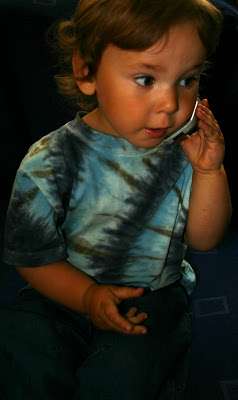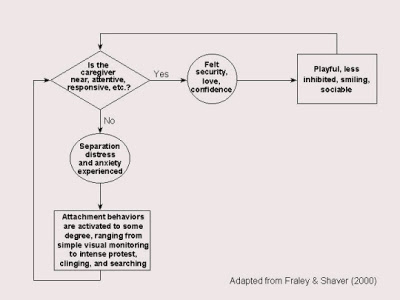As a parent, I find that the more widely I read on subjects not related to parenting, the more I find ideas that give me a new way to think about my parenting decisions. While reading articles on business and marketing, I came across the subject of Regulatory Focus Theory.
This theory, formulated by Professor E. Tory Higgins at Columbia University, proposes that there are two categories of people when it comes to goals. There are the people who have a Promotion Focus, and people who have a Prevention Focus. Promotion Focus is what motivates a person to move toward an aspirational goal, working actively to achieve something that counts as an advantage. The Higgins lab puts it this way: “A promotion focus emphasizes hopes, accomplishments, and advancement needs.” The Prevention Focus creates more cautious behavior, motivated by preventing loss, and is guided by obligation, duty, and rules. As the Higgins Lab says, “A prevention focus emphasizes safety, responsibility, and security needs.” A person’s regulatory focus can either be chronic or momentary, i.e. normal state or induced by a given situation. Promotion-focused individuals may speak of their goals using language such as “I could” “I want to” “I plan to” “I hope to,” while prevention-focused individuals may use language such as “I should” “I have to” “I’m supposed to” while discussing goals.
In marketing and communication, knowing what chronic regulatory focus your audience is likely to have helps you get your message across effectively: “This product will give you a healthy, youthful glow!” vs. “This product will reverse the signs of aging!” “Help your kid get a jump start on his next grade this summer,” vs. “Don’t let your child lose ground this summer!” It’s a subtle difference, but one that advertisers can use very deliberately. And since regulatory focus can be induced, marketing and advertising can play that card as well. (I read about this first in a business magazine, remember?)
So what’s this got to do with parenting? There are at least two connections that I see:
1. We are well-advised to have some idea of our own chronic regulatory focus when it comes to our goals and decision-making, especially as they relate to our families. If we have a prevention focus, we will perhaps be more susceptible to product advertising that plays on our fears and our impulses to be cautious to avoid negative outcomes. The myriad of safety products in the parenting marketplace is stunning, and is clearly targeted toward parents with a prevention focus. And here’s the catch: as the Higgins Lab has found, regulatory focus can be experimentally induced, or situational. Thus when it comes to parenting, we may all skew toward the prevention focus, because what parent doesn’t want to prevent harm or danger to her children?
However, intellectual courage allows us to be critical consumers of information and ask questions about the assumptions that are at work in the media. If we have a chronic prevention focus we can ask if it is being deliberately poked and prodded into a heightened and exaggerated state by the the messages we hear and see; if we find ourselves favoring a momentary or temporary prevention focus we can question whether it is being induced by manipulation of the information we are being shown. We know about internal vs. external locus of control in parenting; we know that being overly protective of our children robs them of the ability to develop self-efficacy and self-reliance. So can we deliberately induce our own prevention focus to become more of a promotion focus (where the advantage is a more courageous and empowered child)? Can we step away from the blazing red warning signs that flash at us from every side and say, “Actually, go ahead and climb that tree, sweetie. I believe you can do it and I’ll watch you from here.”
2. The second reason that Regulatory Focus Theory may be useful to think about in a parenting context is to understand our children’s regulatory focus when it comes to goals (our goals and their goals). It’s essentially a more subtle understanding of a rewards vs. punishments system, carrots vs. sticks. We may be promotion-focused ourselves, and think that offering goodies as incentives is a great way to motivate our child. But if the child is prevention-focused, the goodies may not be that tempting, or not tempting enough to make up for a perceived loss (loss of play time while doing chores, for example). Conversely, we may be prevention-focused ourselves, and find that our dire warnings about consequences fall on the deaf ears of our promotion-focused child (the child who is busy climbing the bookcase to ferret out the t.v. remote for the seventh time, for example. There may be other reasons, such as lack of impulse control, at work in this example, but I think it’s a good illustration of climbing toward a goal!).
I have learned through experience that my own daughter is much less motivated by potential rewards than she is by potential losses. Right now (she’s 12) we operate in a “sleepover-based economy,” where the status quo = two sleepovers (Friday and Saturday) each weekend. Because I want her to develop an internal locus of control, I have told her I will no longer remind her about her chores, and that if she forgets any of her chores on a given day she loses a sleepover. Forget another day, and there goes the second sleepover. What I could do is experiment in shifting her to a promotion focus by making the status quo = zero sleepovers; then, doing chores without reminding for half the week earns one sleepover and doing chores for the second half of the week earns a second sleepover. But for right now, her prevention focus is helping her achieve the goal of remembering her chores.
“But wait, Jennifer!” you say, “Why would you want to shift her to a promotion focus if the prevention focus is working?”
Let’s go back to the Regulatory Focus Theory. An eager, promotion-focused person is likely to be more flexible and creative in finding ways to reach a positive outcome; a vigilant, prevention-focused person is likely to be more thorough and diligent in taking steps to avoid a negative outcome. Both can generate success, both can achieve goals. (Both approaches can potentially create an A+ student, for example, or a junior tennis champ, if that’s your idea of a great goal.) A prevention-focused child might be very good at studying for and acing tests, but not so good at thinking outside the box – he likes the box. He wants to stay in the box. A promotion-focused child will stack the boxes in order to climb up them to reach a goal, but might not study for a test in a subject that doesn’t interest him.
So why favor promotion focus? Because Lion’s Whiskers is about courage! By definition, the prevention focus is protective and vigilant against threats and losses; in other words, it’s about fear and external locus of control. The duties, obligations and responsibilities which guide the prevention focus come from the outside – from parents, teachers, society, church, and state. Is innate temperament a factor in regulatory focus? Yes, research suggests so, but research also suggests that environment and nurturing play a role as well. Babies are mostly aspirational, promotion-focused – they know what they want and do whatever they can to achieve it (screaming is an effective strategy). It’s only as they mature and learn rules and expectations that they may become more prevention-focused. Thus, as parents we may have the opportunity to influence our children’s regulatory focus and nudge it toward promotion and away from prevention. Ultimately, we want our children to eagerly reach for their own goals, not just follow the goals we impose on them because they have to.
Regulatory focus isn’t the only factor at play by any means, but it’s a useful one to take into account in our conversation. I hope you find it that way.
Sources:
Halvorson, Heidi Grant, Getting Others to Embrace Risk, Harvard Business Review, May 23 2011
Kirmani and Zhu, Vigilant Against Manipulation: The Effect of Regulatory Focus on the Use of Persuasion Knowledge, American Marketing Association
Mooradian, Herbst and Matlzer, The Interplay of Temperament and Regulatory
Focus on Consumer Problem-Solving Modes, Social and Personality Psychology Compass 2/4 (2008)
Summerville, Amy and Neal J. Roese; Self-Report Measures of Individual Differences in Regulatory Focus: A Cautionary Note, 2009
 In the first year or so that my daughter, the Lovely K., was with me, she found phone conversations and leaving messages very challenging. She was eight, and had not had very much experience with phones in Ethiopia, if any. In many parts of the world, cell phones have leap-frogged right over land lines in places that never had phone service at all, but even so, not everybody can afford it. It is not unusual for just one person in an extended family or neighborhood to have a phone, and pass along messages and loan the phone as required.
In the first year or so that my daughter, the Lovely K., was with me, she found phone conversations and leaving messages very challenging. She was eight, and had not had very much experience with phones in Ethiopia, if any. In many parts of the world, cell phones have leap-frogged right over land lines in places that never had phone service at all, but even so, not everybody can afford it. It is not unusual for just one person in an extended family or neighborhood to have a phone, and pass along messages and loan the phone as required. In the first year or so that my daughter, the Lovely K., was with me, she found phone conversations and leaving messages very challenging. She was eight, and had not had very much experience with phones in Ethiopia, if any. In many parts of the world, cell phones have leap-frogged right over land lines in places that never had phone service at all, but even so, not everybody can afford it. It is not unusual for just one person in an extended family or neighborhood to have a phone, and pass along messages and loan the phone as required.
In the first year or so that my daughter, the Lovely K., was with me, she found phone conversations and leaving messages very challenging. She was eight, and had not had very much experience with phones in Ethiopia, if any. In many parts of the world, cell phones have leap-frogged right over land lines in places that never had phone service at all, but even so, not everybody can afford it. It is not unusual for just one person in an extended family or neighborhood to have a phone, and pass along messages and loan the phone as required.


![Coraline [CORALINE] [Hardcover]](http://ws.amazon.com/widgets/q?MarketPlace=US&ServiceVersion=20070822&ID=AsinImage&WS=1&Format=_SL160_&ASIN=B002VLRY14&tag=lioswhi-20)






